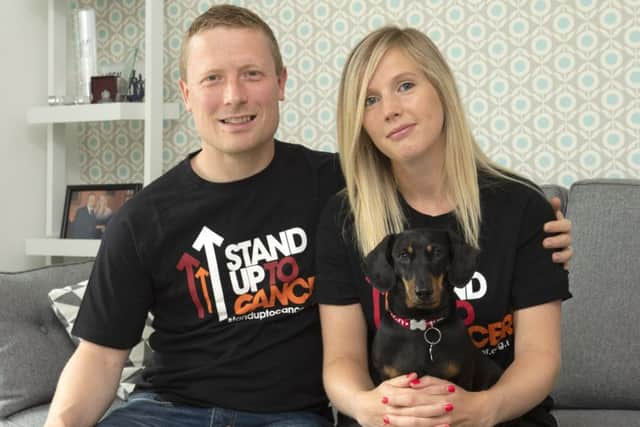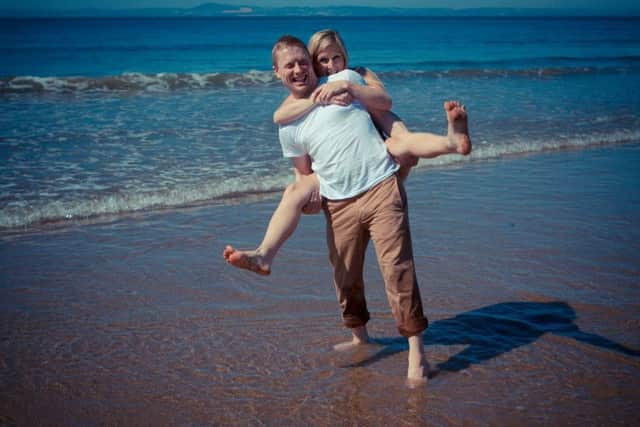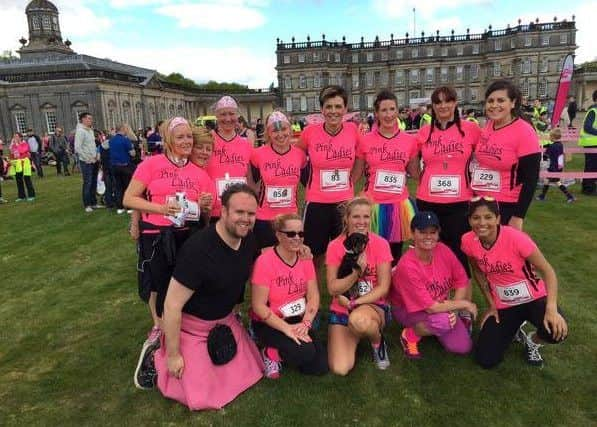West Lothian woman battling cancer will be woken up during surgery to remove brain tumour
and live on Freeview channel 276
After being rushed to St John’s Hospital in Livingston, doctors told her that she had a brain lesion and the 32-year-old was facing her second round of cancer.
Now Heather, who lives in Winchburgh with husband Gordon and miniature dachshund Parsnip, will be woken up during surgery to remove the tumour.
Advertisement
Hide AdAdvertisement
Hide AdShe will undergo the nine-hour procedure, called an “awake craniotomy”, at the Western General Hospital in Edinburgh next Monday. Surgeons plan to ask Heather simple questions on the operating table so they can monitor her movements and cut away as much of the tumour as possible without harming healthy tissue.


She said: “I know that each day closer to surgery means one step closer on the road to recovery. There are times when it all feels overwhelming but most days I am strong. I hate cancer. I really hate what cancer does to people’s lives. I hate the pressure cancer puts families under and I hate seeing the people I love worry.
“There are emotionally charged appointments, the agony of waiting for results, difficult treatments and of course the horrid and very real fear of death. But I’m determined to use my personal experiences to flip the negatives and find some positives.”
Ahead of the pioneering surgery, Heather has been chosen as the face of the Stand Up To Cancer, a joint fundraising campaign from Cancer Research UK and Channel 4.
Advertisement
Hide AdAdvertisement
Hide AdHeather hoped to have put her days of fighting cancer behind her after successfully beating cervical cancer in 2014. A talented hockey player, she was back training weekly, ran the London marathon and started a new job as a fundraising manager for Cancer Research UK when she had the seizure. She said: “It felt like it had come out of nowhere. In the two days beforehand I’d felt really down which was out of character for me but there had been no warnings this was going to happen.”


After a CT scan revealed what doctors described as a lesion on Heather’s brain. More tests led to a diagnosis of a 4cm brain tumour on the right hand side of her brain in an area known as the primary motor strip which controls movement on the left hand side of the body. Doctors suspected it was a glioma but would be unable to reveal what type until it was tested following surgery.
Heather said: “I had a huge list of questions. What did this mean? I look after myself. I’ve never smoked, I hardly drink and I love sport. Was it just really bad luck that I was facing cancer again at a young age? The doctors said the brain tumour was not related to the cervical cancer I’d had before which was a relief. It seemed so unfair then that this would strike me twice.”
Heather was put on medication to help prevent another seizure and wasn’t allowed to drive. Determined to make every second count, Heather filled this summer with activities including hill walking, canoeing, hockey tournaments and special time with family and friends and started a blog, www.fucancer.co.uk.
Advertisement
Hide AdAdvertisement
Hide AdAfter discovering the tumour had grown, doctors scheduled Heather’s surgery. They explained that Heather would have a general anaesthetic at the start of the operation then the anaesthetic would be reduced so Heather was awake for the main part where the tumour is removed. During an awake craniotomy, the surgeon checks the function of different parts of the brain by asking the patient to make certain movements or speak.


Heather said: “They’ll put me to sleep, take a bit of my skull out then once I’m stable they’ll wake me up and ask me to do certain things. It’s a big psychological thing and it was absolutely my decision whether to go ahead. It will be an odd experience during surgery but I actually think it may be harder on my family and friends who have to sit and wait for news.”
Heather has been told it will take around three months to recover after surgery and she may then also face chemotherapy and radiotherapy. But she’s positive about the future. She said: “I’ve been through cancer before and built up a level of resilience. I’m lucky to have the best support network around me and feel in very safe hands. I’m proud to Stand Up To Cancer on behalf of all the patients going through cancer right now.”
Since Stand Up To Cancer was launched in the UK in 2012, more than £38 million has been raised and over 35 trials and projects have been funded, that involve more than 8,000 patients.